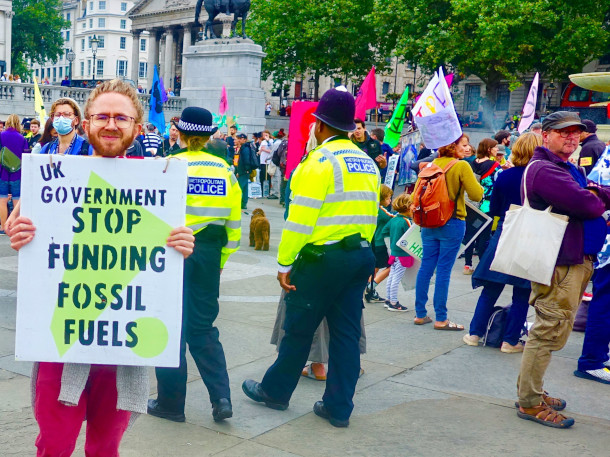Fossil Fuels Richly Subsidized
Air Date: Week of September 29, 2023

A protester in the UK rallies against United Kingdom funding of fossil fuel projects (Photo: Gerry Popplestone, Flickr, CC BY-NC-ND 2.0)
Governments are increasingly touting clean and renewable energy as the way of the future. But if you follow the money, you would find that fossil fuels are receiving massive subsidies, worth around $7 trillion dollars each year, according to a recent report from the International Monetary Fund. Antung Liu is a coauthor of the report and joined Living on Earth Host Steve Curwood to explain how the fossil fuel industry is receiving such generous subsidies every year.
Transcript
O’NEILL: Governments and the private sector are increasingly touting clean and renewable energy as the way of the future. But if you follow the money, you might get a very different impression. That’s because fossil fuels are receiving subsidies worth around $7 trillion dollars each year, according to a recent report from the International Monetary Fund or IMF. Antung Liu is a Technical Assistance Advisor with the International Monetary Fund and a coauthor of the report. He joined Living on Earth Host Steve Curwood.
CURWOOD: Your paper talks about $7 trillion in subsidies; about a trillion and a half of that are direct, or explicit, subsidies. How do governments directly give money to the fossil fuel industry?
LIU: These aren't typically handouts directly to the fossil fuel industry. Rather, they're handouts that they intend for people. A lot of governments are extremely sensitive to the prices of energy, because it's very popular to have low energy prices. For example, in the United States, one of the most salient or visible prices in the economy is the price of gasoline. Every corner, you drive around, and you see these prices posted. And so people are really sensitive about these prices. So a lot of governments subsidize the cost of energy in order to stay popular, in order to keep the prices of energy commodities low. So that 20%, that 1.4 trillion, is that: keeping prices artificially low, below what it should cost to make these energy products.
CURWOOD: Now, implicit subsidies are prices that don't consider the social costs, such as air pollution, or climate disruption, or congestion, or development issues. And I guess 80% of the subsidies that you looked at are implicit. How can you capture the value, though, of those implicit subsidies? How can you put a price, say, on air pollution or climate change or congestion?
LIU: So it's a separate line of work to think about how big the external cost of energy products is. So, the cost to society not reflected by the gas seller or the gas consumer, the person buying the gas or the gas station. And so for example, the external cost of gasoline is congestion. It's been found to be the number one cost, which is that when I drive my car, I don't consider the effects of driving my car on other people, and especially in cities like New York, or Los Angeles, the congestion is very high. And so when I drive my car, it causes other people to not get to their places as quickly. For coal fired power, for example, the air pollution is very high. So it sheds particulate matter, unless you put a scrubber on it, there's sulfur dioxide, that has a negative impact on our health. All these costs should be reflected in the price to the consumer. And the best way to do that is a price on carbon. So there's nearly universal agreement among environmental economists and the economics profession in general, that we need to think about a carbon tax or emissions trading system, an ETS, in order to help the market cost of fossil fuel reflect its social cost.

According to the IMF, fossil fuels receive implicit subsidies when they are not priced to account for external costs including those resulting from air pollution. (Photo: 君勇 林,Flickr, CC BY-NC 2.0)
CURWOOD: Hmm. Boy, getting stuck in traffic in Boston, the way many of us, where our studio's located, that price would be very high! It takes a long time to get across town.
LIU: Yeah, absolutely. You think about all the millions of people stuck in traffic, all the time that lost, what they could be doing otherwise, that's the real pain of congestion.
CURWOOD: Now, how do fossil fuel subsidies compare to renewable and carbon free energy subsidies?
LIU: This is a great question and one that we didn't directly examine in our report. I found statistics from the International Energy Agency, which found that in 2022, global spending on clean energy, not subsidies, was only $1.6 trillion. This is dwarfed by the $7 trillion figure that we find in our report. To examine the question of subsidies and fossil fuels versus those subsidies on renewable energy, I found a report in 2020 from the International Renewable Energy Agency, which said that explicit fossil fuel subsidies were larger than those on renewable energy by a factor of 19. In other words, we claim as a society that we'd like to subsidize renewable energy, we'd like to foster it and promote it. But in fact, we subsidize and promote fossil fuels much more.
CURWOOD: Sounds like for almost every $20 bill that's spent on government subsidies for fossil fuels, less than $1 goes to the renewable energy business.
LIU: That's an apt way of putting it, yeah.
CURWOOD: So what is the economic case for eliminating fossil fuel subsidies?
LIU: So government budgets are limited, you know, we're living in a time where nearly every country operates at a deficit. The United States, you know, the CBO, Congressional Budgetary Office, recently said that spending exceeds our revenues by like 5% of GDP each year. And so there's limited fiscal resources to go around. And one of the points we make is that when there's a time of limited fiscal resources, you shouldn't spend money on things that are very wasteful. You know, you could be spending money on health care, you could be investing in education or infrastructure. Instead, you're artificially lowering fossil fuel prices. And that has a negative impact to health, to congestion, to global warming. You got to understand that the social cost is actually mostly local, the benefits received from reducing fossil fuel subsidies aren't realized far away. So if China reduces its emissions, the United States perceives a part of the benefit but most of it stays in China. For example, congestion and air pollution are both local environmental problems. And so it's in most countries' self-interest to eliminate subsidies.
CURWOOD: All right, time for a reality check, Professor Liu. The fossil fuel industry is extremely powerful and influential, to put it mildly, and deeply involved in political systems and governments around the world. So how can these subsidies get phased out?

Antung Liu is a Technical Assistance Advisor at the International Monetary Fund. (Photo: Courtesy of Antung Liu)
LIU: We think that the benefits to society are very large. And you're right, that there are costs on some parties. So as a society, we need to agree collectively that we want to move into a better place. We think that a price on carbon should be part of a comprehensive reform. Raising people's fuel prices is really unpopular, right? Like if you raise my electricity cost here, I'd be grumpy about it. I think a lot of people might feel that way, if that's all that happened. But then when you consider the broader implications of a policy package that we think should include it all, which is, you know, spending the money that you were previously using on explicit fossil fuel subsidies and putting it somewhere else, to invest in health care. So when Iran eliminated its subsidies on gasoline, it sent households a check, every household got a check that helped cushion the blow. And for the poorest households who weren't spending very much money on gasoline, because maybe they didn't have a car or they didn't use a car very much. They were actually much better off than they would have been. I think that'd be popular and you know, people would begin to see hey, overall, we're better off when we have raised the price of energy.
O’NEILL: Antung Liu is a Technical Assistance Advisor with the International Monetary Fund. He spoke with Living on Earth Host Steve Curwood.
Links
Living on Earth wants to hear from you!
Living on Earth
62 Calef Highway, Suite 212
Lee, NH 03861
Telephone: 617-287-4121
E-mail: comments@loe.org
Newsletter [Click here]
Donate to Living on Earth!
Living on Earth is an independent media program and relies entirely on contributions from listeners and institutions supporting public service. Please donate now to preserve an independent environmental voice.
NewsletterLiving on Earth offers a weekly delivery of the show's rundown to your mailbox. Sign up for our newsletter today!
 Sailors For The Sea: Be the change you want to sea.
Sailors For The Sea: Be the change you want to sea.
 The Grantham Foundation for the Protection of the Environment: Committed to protecting and improving the health of the global environment.
The Grantham Foundation for the Protection of the Environment: Committed to protecting and improving the health of the global environment.
 Contribute to Living on Earth and receive, as our gift to you, an archival print of one of Mark Seth Lender's extraordinary wildlife photographs. Follow the link to see Mark's current collection of photographs.
Contribute to Living on Earth and receive, as our gift to you, an archival print of one of Mark Seth Lender's extraordinary wildlife photographs. Follow the link to see Mark's current collection of photographs.
 Buy a signed copy of Mark Seth Lender's book Smeagull the Seagull & support Living on Earth
Buy a signed copy of Mark Seth Lender's book Smeagull the Seagull & support Living on Earth

